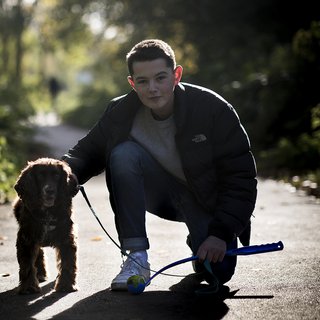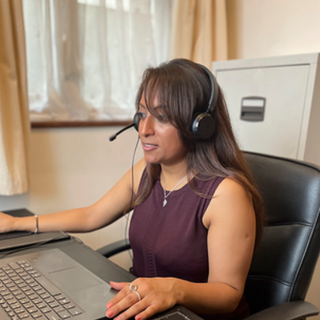Young adults: treatment centres and your treatment team
As a young adult, you'll be treated by people who are trained to treat blood cancer in adults under 25.
If you're aged 19 to 24
You should have a choice of where you’re treated. You can choose between your nearest specialist TYA (teenagers and young adults) unit, or the adult cancer service at a hospital which is approved to treat young adults.
Emily (diagnosed at 21) chose to be treated at a specialist TYA unit:
Hinna (diagnosed at 23) chose her local hospital:
If you're aged 16 to 18
You should be treated at a hospital that specialises in treating young adults with cancer. The unit where you’ll be treated is called a TYA (teenagers and young adults) unit or young people’s unit.
Teenagers and Young Adults with Cancer publish:
Questions to ask about treatment centres
Here are some questions to think about if you have a choice about where you’re treated. You might want discuss them with your family, doctor or nurse.
Will I need to stay in hospital for treatment?
- If I'm allowed visitors, will it be easy for people to visit me?
- What are the visiting hours?
Will I be treated as an outpatient (no overnight stays)?
- How will I get to my appointments?
- Is there someone to drive me?
- Is it safe for me to travel by public transport?
- Can I get financial support for travel?
I had to travel, which was a pain, but it was worth it. It felt kind of like home there.
- Emily, treated at a TYA unit
How old will the other patients be?
- How do I feel about being treated with older people?
- Would I prefer to be treated with people my age?
What's the treatment centre like?
- Does it have free wifi?
- Can I watch TV or play games there?
- Will I be able to meet other people my age who have cancer?
What services does it offer?
- Are there youth support workers?
- Do they offer counselling?
- Will there be support for my family?
I didn’t want to commute for an hour to have chemo, there and back.
- Hinna, treated at her local hospital

Help others by sharing your story
Having blood cancer can feel very lonely. People say that it helps to hear from others in a similar situation - how they feel and how they're getting through it. You can help by sharing your story, when you're ready.
Medical appointments
If you're diagnosed with blood cancer, you're bound to have a lot of medical appointments – for tests, treatment and check-ups.
This can be stressful at the best of times, and the coronavirus pandemic doesn't help. But hospitals are open, and they're doing everything they can to protect you from coronavirus and other infections.
Because blood cancer affects your immune system, you’re more likely to get infections, and your risk of getting seriously ill from coronavirus is higher than for other people your age. But it’s really important that you go to all your medical appointments because it’s all part of the plan to make you well again.
Your hospital and GP will try to keep face-to-face appointments to a minimum. And if you do need to see them in person they'll take special care about the risk of infection.
Here are some of the things they'll do:
- Phone appointments – Some appointments might be offered by phone or video call so you don’t need to go to a hospital or clinic as often.
- Medicines delivered – You may have medicines delivered to your home, or may be able to pick them up from a ‘drive-through’ dispensary.
- Local blood tests – You may have blood tests done at a local clinic instead of at your hospital.
- Arrival times – If you have a hospital appointment, you may be asked not to arrive early so you don’t have to sit in the waiting area. If you drive to appointments, you may be asked to wait in your car until you receive a text to come in.
- Change of treatment centre – Your treatment may switch to another hospital if it’s safer for you.
- No family or friends – You may be asked not to bring anyone with you to appointments. This is another important way of protecting people from coronavirus, but it's tough on you and your family. The Hand 2 Hold campaign has been set up to support young adults facing appointments on their own.
If you need to visit hospital for an appointment or stay in for treatment, the staff will take extra care to protect you with things like PPE (personal protective equipment) and extra cleaning.
They’ll also keep coronavirus patients well away from cancer patients and you’ll be treated by specialist staff who don’t work with coronavirus patients.
Hand 2 Hold campaign
It can be tough going to medical appointments on your own, but because of coronavirus, that's unfortunately what's happening for many young adults with blood cancer. Teenage Cancer Trust and CLIC Sargent have got together to launch a campaign to support young adults with cancer who are facing appointments and treatment without a parent, friend or partner by their side. Find out more and pledge your support.
Travelling to appointments
The best way to travel right now is by car, on your own or with someone you live with. Next best, ask someone else if they can drive you – check first that they don’t have symptoms of coronavirus. Sit in the back of the car on the left.
Ask your hospital if they have a patient transport service. Other organisations may be able to help with transport while the pandemic is still a problem, including:
If you need to go by taxi, ask what the taxi company can do to protect you, and follow the advice of the driver.
If you have to travel by public transport, try to stay two metres away from other people, or at least face away from them. Try not to touch surfaces and don't touch your face. Wash your hands or use hand sanitiser as soon as you get where you’re going. And wear a mask or face covering – it’s now the law for everyone to do that.
Staying in hospital
If you’ve got a fast-growing blood cancer like acute leukaemia, there’ll be times when you need to stay in hospital for a few weeks. For other blood cancers, you may stay at home and just visit hospital for treatment. Your doctor or nurse will tell you what’s likely for you.
Who's who in your healthcare team
Your team is here to support you – not just with the medical stuff, but anything you’re worried about.
Consultant
The person who’s in charge of your treatment. For blood cancer, it's usually a consultant haematologist, a doctor who specialises in treating blood diseases.
Clinical nurse specialist (CNS)
Your main point of contact – someone who’ll answer your questions, get to know you and treat you as a person, not just a patient.
Don’t be afraid to ask questions and tell people what’s important to you.
- Hinna
On hand to explain your rights, arrange financial support for you and your family, or put you in touch with organisations that can help.
Psychologist
A trained listener who’ll help you talk through your thoughts and feelings and support you with the emotional effects of cancer.
Youth support worker
Someone who’ll help you keep your social life going and stay connected to people, even if you‘re stuck in hospital for a while.
Dietitian
Trained to advise people on problems with nutrition – the person to see if treatment makes eating and drinking difficult.
Physiotherapist
Helps you get back on track If you’re having trouble with your mobility. Can also advise you on how to exercise safely.
Occupational therapist (OT)
A problem-solver who can help if treatment makes it difficult to do everyday things like getting dressed or climbing stairs.
Our videos
The videos on this page were shot before the coronavirus pandemic. Some activities described might not be possible at the moment. See our guidance on staying safe.

Talk to other people affected by blood cancer
Hear from and connect with people who understand.




Social worker